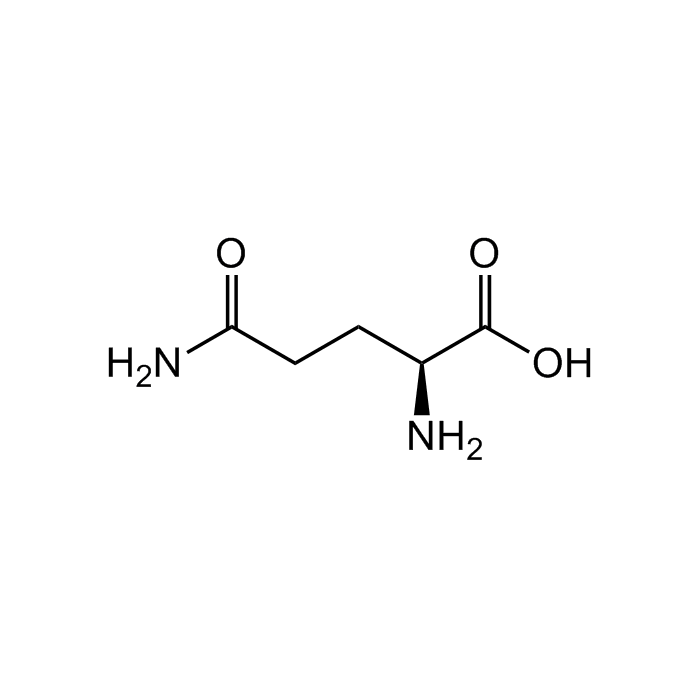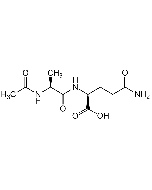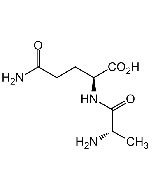Cookie Policy: This site uses cookies to improve your experience. You can find out more about our use of cookies in our Privacy Policy. By continuing to browse this site you agree to our use of cookies.
AdipoGen Life Sciences
L-Glutamine [H-Gln-OH]
As low as
24
CHF
CHF 24.00
In stock
Only %1 left
AG-CR1-3534-G0011 gCHF 24.00
AG-CR1-3534-G0055 gCHF 45.00

| Product Details | |
|---|---|
| Synonyms | (+)-Glutamine; Levoglutamide; (S)-2,5-Diamino-5-oxopentanoic acid; L-Glutamic acid 5-amide; NSC 27421 |
| Product Type | Chemical |
| Properties | |
| Formula |
C5H10N2O3 |
| MW | 146.1 |
| CAS | 56-85-9 |
| RTECS | MA2275100 |
| Purity Chemicals | ≥99% (TLC) |
| Appearance | White to off-white powder. |
| Solubility | Soluble in water (30 mg/ml). |
| Other Product Data |
Note: L-Glutamine is very stable as a dry powder and as a frozen solution. In liquid media or stock solutions, however, L-glutamine degrades relatively rapidly. The rate at which degradation proceeds is a function of time, temperature and pH. If used as a cell culture supplement, a 200mM stock solution (29.2mg/ml L-glutamine in 0.85% NaCl) can be prepared. The optimal concentration is dependent upon the cell type and medium used to culture the cells, but generally falls in the range of 2-6mM. |
| InChi Key | ZDXPYRJPNDTMRX-VKHMYHEASA-N |
| Smiles | NC(CC[C@H](N)C(O)=O)=O |
| Shipping and Handling | |
| Shipping | AMBIENT |
| Short Term Storage | +20°C |
| Long Term Storage | +4°C |
| Handling Advice | Protect from light and moisture. |
| Use/Stability | Stable for at least 2 years after receipt when stored at +4°C. |
| Documents | |
| MSDS |
 Download PDF Download PDF |
| Product Specification Sheet | |
| Datasheet |
 Download PDF Download PDF |
Description
- L-Glutamine is an amino acid and is essential in the formation of purine and pyrimidine nucleotides, amino sugars, glutathione, L-glutamate and other amino acids as well as in protein synthesis and glucose production.
- It plays also a role in lipid synthesis (e.g. in cancer cells), cellular energy as a source next to glucose, nitrogen donation for many anabolic processes, including the synthesis of purines and carbon donation, as a source refilling the citric acid cycle. It is a nontoxic transporter of ammonia in the blood circulation and a precursor to the neurotransmitter glutamate and GABA.
- L-Glutamine is an essential amino acid which is a crucial component of culture media that serves as a major energy source for cells in culture.
- L-Glutamine exerts potent antioxidant and anti-inflammatory effects, next to its roles in cell proliferation and cancer. Levels of L-glutamine in human white adipose tissue (WAT) are linked with obesity-associated inflammation. Addition of L-glutamine in obese mice attenuated adipose tissue inflammation. Reduced L-glutamine levels during obesity shift the balance from glutaminolysis toward glycolysis, leading to nuclear O-GlcNAcylation, which activates inflammation.
Product References
- Therapeutic considerations of L-glutamine: a review of the literature: A.L. Miller; Altern. Med. Rev. 4, 239 (1999) (Review)
- Why is L-glutamine metabolism important to cells of the immune system in health, postinjury, surgery or infection? P. Newsholme; J. Nutr. 131, 2515S (2001) (Review)
- Role of L-glutamine in critical illness: new insights: D. Kelly & P.E. Wischmeyer; Curr. Opin. Clin. Nutr. Metab. Care 6, 217 (2003) (Review)
- Glutamate synthase: a fascinating pathway from L-glutamine to L-glutamate: R.H. van den Heuvel, et al.; Cell Mol. Life Sci. 61, 669 (2004) (Review)
- Supplementation with L-glutamine prevents tumor growth and cancer-induced cachexia as well as restores cell proliferation of intestinal mucosa of Walker-256 tumor-bearing rats: H.A. Martins, et al.; Amino Acids 48, 2773 (2016)
- Glutamine Links Obesity to Inflammation in Human White Adipose Tissue: P. Petrus, et al.; Cell Metab. 31, 375 (2020)







